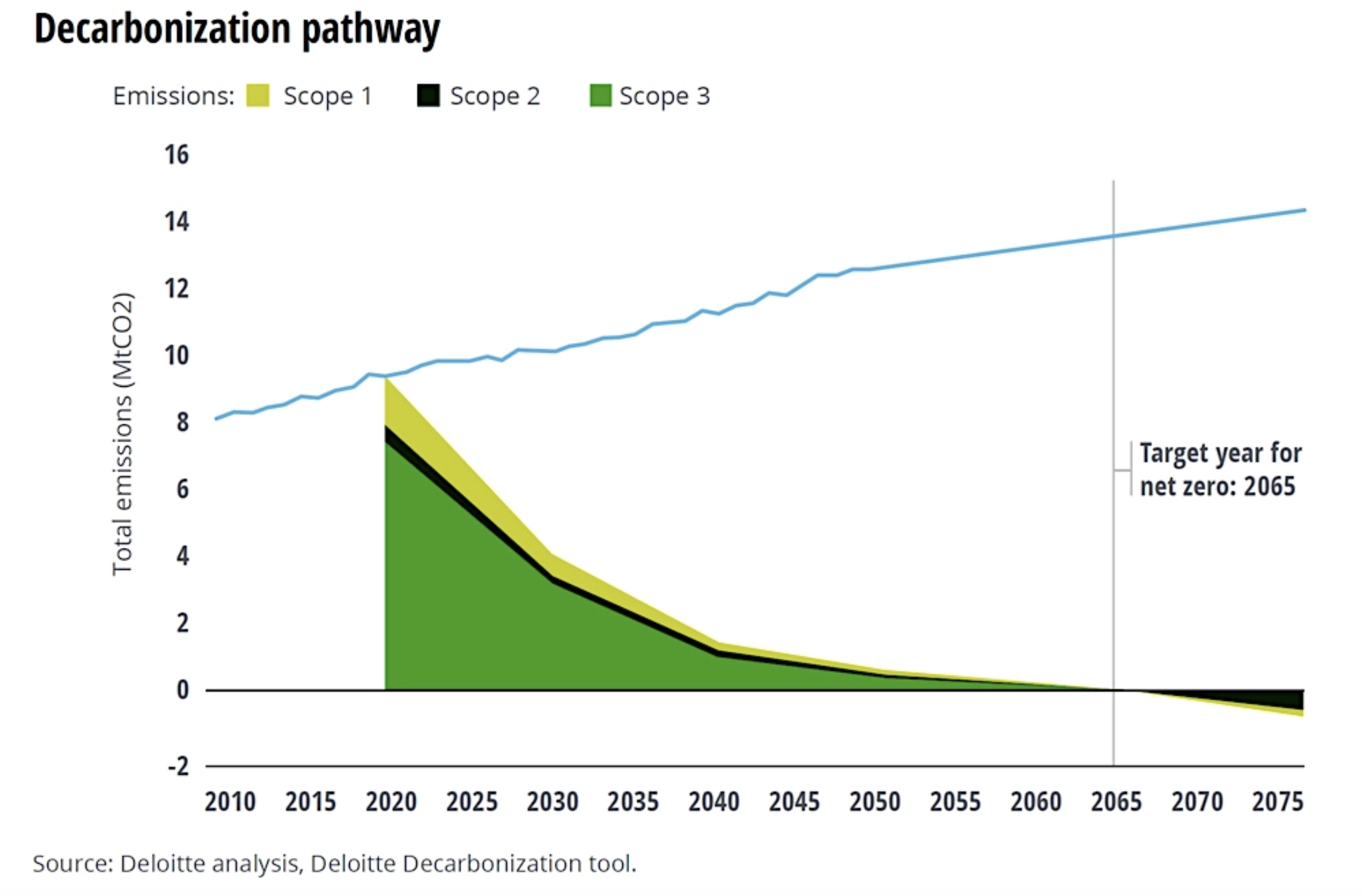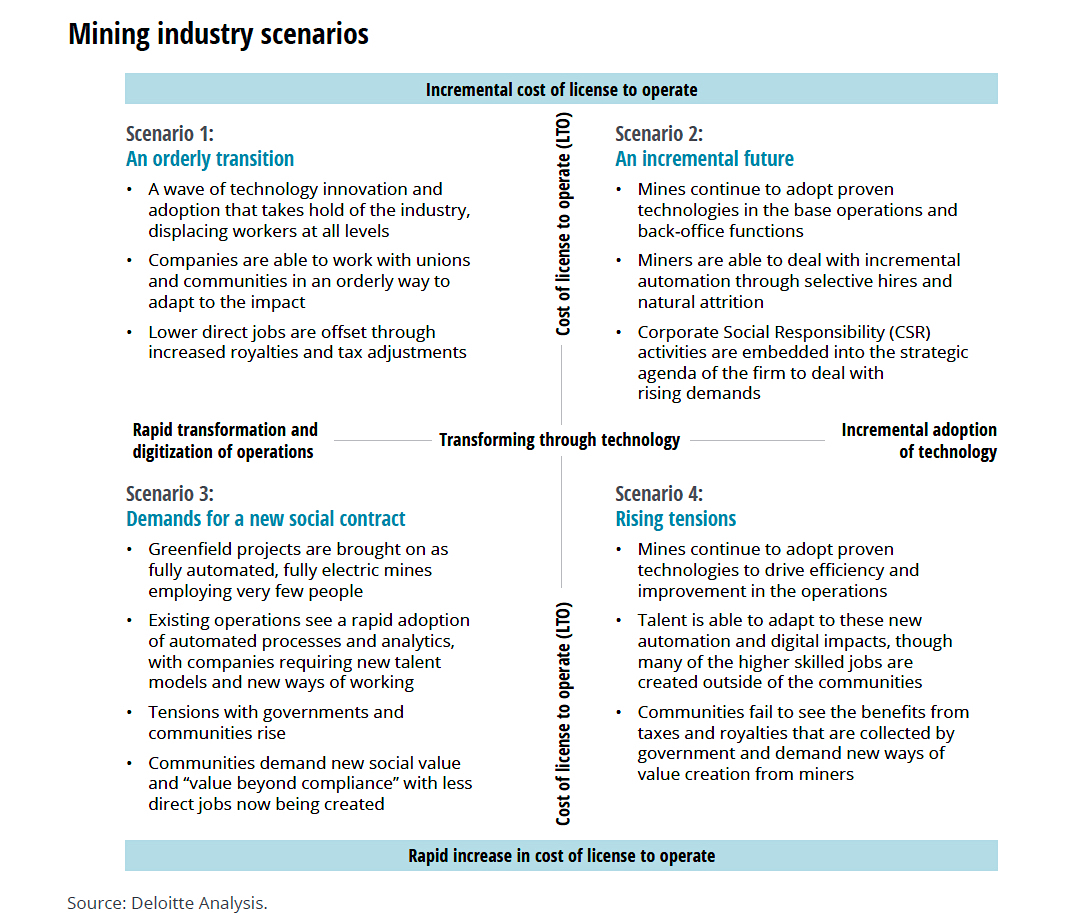The mining and metals sector is facing greater scrutiny from communities at host countries, end consumers and society at large, demanding transparent, ethical supply chains, as well as a lower carbon footprint.
Rather than declining any time soon, the pressure to meet those expectations will force resource companies to redefine the way they do business, shaping the sector in the short and medium term, a study published Monday shows.
According to Deloitte’s “Tracking the Trends” annual mining report, now in its 12th edition, miners will have to work this year on building trust with communities, consumers and investors.
Particular attention is being paid to how companies are addressing issues such as climate change, water management, health and safety, and the fair treatment of workers and communities, the report highlights.
Investing in environmental, social and governance (ESG) is currently estimated at over $20 trillion in assets under management and those numbers are only expected to grow. Companies that fail to deliver value beyond compliance could face financial consequences and a blow to their reputations.
“Many investors are making it clear that they will not advance funds unless companies can demonstrate a meaningful and measurable commitment to the principles so much of society holds dear,” says Leeora Black, Principal, Risk Advisory, Deloitte Australia. “This causes mining companies to consider not only threats to public trust, but also potential threats to investor trust.”

(Click to enlarge)
Most top miners are well aware of the need for change and have already kicked off company-wide initiatives. BHP (ASX, LON, NYSE: BHP) recently committed $400 million over five years to reduce greenhouse gas emissions from its operations and mined commodities.
The miner, the world’s largest, has promised to reduce its Scope 3 emissions (those generated by end users), an important consideration given it is the top exporter of coking coal used in the steelmaking and number three in iron ore, the raw material for steel.
Rio Tinto (ASX, LON, NYSE: RIO), the world’s second largest miner, signed last year a pact with China’s biggest steelmaker Baowu to develop and implement ways to reduce carbon emissions in the steel sector, which is responsible for about 9% of global carbon dioxide (CO2) emissions.
The transition to a low-carbon economy is well underway and the pressure to accelerate this transition seems to grow every day. As of 2020, roughly 800 financial services organizations with $118 trillion of assets under management have committed to making climate-risk disclosures about their portfolio investments.
“Despite the business case in support of decarbonization, many mining companies continue to see it as a cost rather than an opportunity—making it difficult for proponents to unlock the capital required to move forward,” says Tim Biggs, Mining & Metals Leader, Deloitte UK. “A massive shift toward electrification could also change the way employees work, requiring companies to obtain buy-in not only at the management level, but at the operations level.”
The sector leaders, however, are setting an example in terms of switching towards renewables.
Related: The Survival Of A $2.7 Trillion Market Rests On This Tiny Niche
BHP estimates deals announced last year to switch two giant copper mines in Chile to solar, wind and hydro sources in place of existing coal and gas power will cut energy costs by about 20%.
Anglo American (LON:AAL), which has installed floating solar panels on a copper mine’s waste pond, has said that renewable energy will help deliver cheaper mining operations.
Fortescue Metals Group (ASX: FMG) recently flagged potential savings from new investments to switch mines to renewable energy as it expands a $700 million program to add transmission lines, solar arrays and battery storage in Australia’s Pilbara region.
Together with committing to deliver value beyond compliance and reducing their emissions, companies should pay attention to other growing industry trends that would determine their success. According to Deloitte, they are:
- Partnerships and joint ventures: Be open to consolidating to gain scale. Given the size of capex projects in the mining sector, their location in remote regions, and the growing complexity associated with accessing many ore bodies, companies of all sizes can benefit from partners to finance projects, source critical skills, build local relationships, and share risks.
- Seize opportunity amid uncertainty: Miners should start preparing for the next downturn now. Globally, trade volumes are down and geopolitical tensions remain high. Concerns about China’s economic revival remain front and center. Deloitte’s experts recommend Over-investing in communication, town halls and one-to-one meetings.
“People long for transparency and, in the absence of clear communication, will create their own narrative,” the report highlights. - Dynamically managing risk: Miners should go back to the basics, taking time to redefine their risk appetite, identify gaps in their risk and control framework, and ensure their risk management methodology covers strategic, operational, financial, cyber, regulatory, and environmental risks.
- Embracing intelligent mining through investments in automation, technology modernization and the right workforce: Bringing new technologies into a business is a first step, not the only one needed. Companies will have to also invest in an adaptive workforce, with a new set of skills, to sustain their competitive advantage in global markets. One way companies can ensure they have the right skills in place for intelligent mining is by classifying the capabilities required on a matrix to identify skills gaps and determine how best to fill them.

(Click to enlarge)
- Proactively planning for the social impact of digitalization: In the same way as mining companies conduct life-of-asset and life-of-mine planning, longer-term and more strategic talent planning is becoming more critical to the delivery of planned business outcomes and to ensuring that the possible repercussions on local communities are mitigated.
- Leadership in an industry 4.0 world: The mining workforce of the future needs leaders able to base their decisions not only on decades of hands-on experience, but also on analysis of large sets of data. To leverage emerging data insights, for instance, leaders will likely need digital fluency, data visualization skills, and an understanding of cognitive and AI-driven technologies.
- Tax tribulations: Concerns over “transfer mispricing” put miners in the spotlight. Deloitte recommends the use of bilateral agreements and partnerships with host countries, ensuring compliance with tax regulations and being prepared to be able to substantiate positions and defend against any challenges made by tax authorities, while continuing to maintain healthy relations with government.
In the past, miners thought that generating employment and tax receipts for government was enough to secure a social licence to operate. But in an era of populist politics and growing activism, most mining companies now know they need to do more.
Among the pending tasks, the report highlights, miners need to show how they’re working towards sustainable and inclusive growth, which eventually will help redefine the sector’s image as a responsible source of the minerals and metals that are the base for a green future.

(Click to enlarge)
By Mining.com
More Top Reads From Safehaven.com:
















